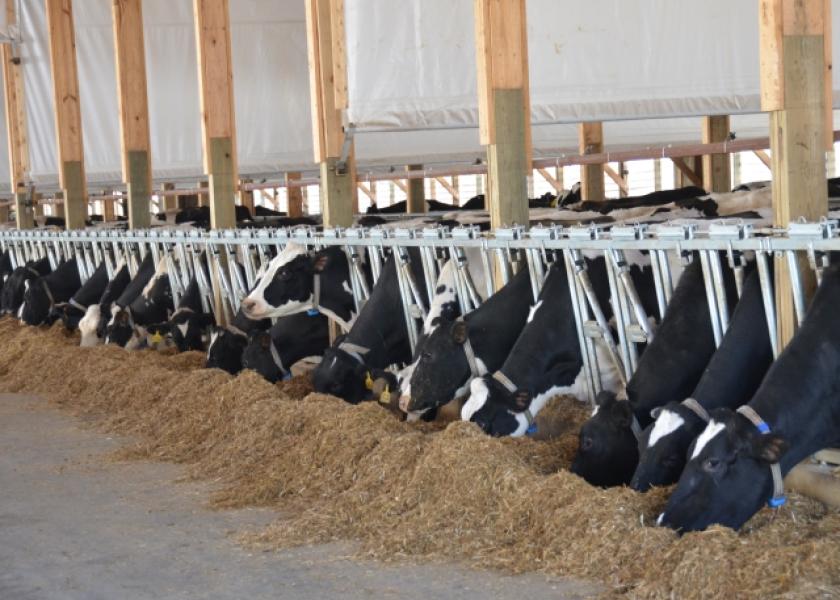New Plant-Based Feed Additive Reduces Enteric Methane, Improves Feed Efficiency

Feedworks USA has introduced Agolin Ruminant, the first product certified by the Carbon Trust to improve feed efficiency and reduce enteric methane, to the U.S. dairy industry. Fed to 1.5 million dairy cows worldwide, Agolin is a plant-based feed additive that harnesses a blend of scientifically selected essential oils. Researchers tested more than 100 different plant extracts to determine their effects on the rumen microbiota and how they can lower a cow’s methane production while improving fat and protein yield and feed efficiency.
“With consumers focused more and more on reducing carbon footprints, the dairy industry is searching for tools to reduce methane,” says Peter Williams, Agolin manager. “Dairy farmers now have something effective that they haven’t had before, which is a way to improve cow performance while having a positive impact on the environment. Feedworks is thrilled to launch Agolin in the U.S. and highlight its growing library of research.”
Here are some results from the company’s initial trials:
- A meta-analysis1 combining 23 studies across 10 different countries revealed that Agolin supplementation increased milk yield by 3.6%, fat and protein corrected milk by 4.1% and feed efficiency by 4.4%, plus methane emissions were estimated to be lowered by about 10%.
- A University of California-Davis study2 evaluated 20 mid-lactation Holsteins, grouped by parity and days in milk and randomly assigned to a top-dressed treatment with Agolin or an un-supplemented control. During the 56-day trial, a research team led by Frank Mitloehner, professor of animal science at UC-Davis, used head chambers to sample enteric gas emissions, including methane, carbon dioxide, ammonia and nitrous oxide. Results showed that enteric methane was reduced by 11.2% per unit of milk in the Agolin-supplemented cows, and enteric ammonia was 18% lower. Dry matter intake was similar between both groups.
- In a recent field trial at Spruce Haven Dairy3, Union Springs, N.Y., researchers determined a $0.72 gain per cow per day for the cost of about $0.05 per day. The study included four pens of approximately 150 multiparous, mid-lactation cows per pen, with cows averaging more than 110 pounds of milk per day. All cows received a common TMR ad libitum, with Agolin administered to two pens via a concentrated farm pack to provide one gram per cow per day. Milk yield did not change with the inclusion of Agolin, but fat and protein percentages were elevated. There was a significant improvement in fat yield per cow per day, resulting in a tendency for fat corrected milk and energy corrected milk to be greater for the Agolin-fed group.
These results have led major consumer brands, such as Nestle (the largest milk buyer in the world) and Barry Callebaut (the largest chocolate manufacturer), to collaborate with the Agolin team and dairy cooperatives in an effort to meet their commitments to carbon footprint reductions.
“These companies want more milk from Agolin-fed cows to help offset their carbon footprints,” adds Williams. “The potential is a win-win-win. Dairies can benefit from improved feed efficiency, increased energy-corrected milk and reduced methane, while consumer brands can work on their goals to reach net-zero global emissions, and people can feel good about those brand purchases.”
To learn more about Agolin Ruminant and the research trials, visit the Agolin Ruminant page at www.feedworksusa.com.
1 A Meta-analysis Describing the Effect of the Essential Oils Blend Agolin Ruminant on Performance, Rumen Fermentation and Methane Emissions in Dairy Cows.
A. Belanche, C. Newbold, D. Morgavi, A. Bach, B. Zweifel & D. Yanez-Ruiz.
2 The Impact of Essential Oil Feed Supplementation on Enteric Gas Emissions and Production Parameters from Dairy Cattle.
A. Carrazco, C. Peterson, Y. Zhao, Y. Pan, J. McGlone, E. DePeters & F. Mitloehner.
3 Evaluation of Agolin, an Essential Oil Blend, as a Feed Additive for High-Producing Cows.
P. Williams, J. Clark & K. Bean.







